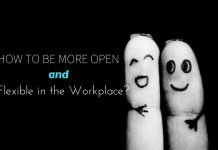Have you heard about how Unilever, a British-Dutch conglomerate, took over Ben & Jerry’s?
It’s a story of sheer courage of the CEO to show adaptability.
Ben and Jerry were known for their best ice cream flavors like Karamel Sutra, Chocolate Therapy and Imagine Whirled Peace.
The CEO, in fact, preserved those intangible assets while introducing the company’s own managerial controls.
The culture change within the acquisition brought about many challenges and those who adapted to those changes survived.

Define Adaptability:
Adaptability is the nature of changing or create modifications in oneself to suit to the new environment. For a workplace culture, it means that a person must be open to new ideas or changes, must be able to work independently or in teams, or carry out tasks that are not intended for one person only.
Employers are increasingly shifting from single roles to the rotation of roles and flexible job descriptions. It’s a sought-after skill as it indicates the employee can adapt to changing customer needs, technology trends.
It is also tied to career growth as the person becomes more equipped.
An adaptable person is someone who can carry out multiple tasks, manage multiple assignments by setting priorities and making changes to attitude to merge with the new culture.
To function or perform in the world in any situation or circumstance requires an individual to possess the basic skill of adaptability.
Hence, the importance of adaptability gets stronger when there are more given opportunities.
Flexibility at Work Definition:
Flexibility at the workplace allows one to evaluate what is happening and adjust to the role and responsibilities or even the job being offered.
It is very important for the employer and employee to be flexible as it creates a streamlined workforce and technology adopted, due to changes in the market.
Importance of Flexibility in the Workplace:
There are various other factors when we talk about the word ‘flexible’ at work and the importance of flexibility.
1. Open to trend:
This attitude shows that either the employer or the employee are willing to take their chances and wade through. Their mind is ready for adapting to change that is about to come and take on the challenges. They respond well to the changes quickly.
2. Not rigid in thoughts:
People who are flexible can be approached easily as they would accept the changes ready to implement them. They do not show rigidity in accepting the views. Having workplace flexibility skills allows for pushing through changes that are inevitable.
3. Adjusting to situations:
These people can easily adjust to the situation they encounter. They know how to adjust and what to do. They can be relied on when assigned with new projects.
It’s futile in showing resistance to changes as it will only cause undue stress. Such employees are ready to take assignments other than what their role was meant to be.
4. Effective problem solving:
As these people would have faced many situations that forced them to take the call for making changes within their system or attitude, they seem to be effective in finding solutions to problems. In fact, they know where to look for in case of any problems.
5. Able to negotiate:
Having flexible team members would definitely bring in negotiation at ease. Their outlook on the aspect of negotiation is easily identified. They seem to know which portfolio to take into consideration to make that negotiation work out best.
6. Work under pressure:
There could be times when the company may not be performing well and need to downsize their payroll. These people come to the rescue as they can handle pressure or workload. Their skills might not fit but as they show the willingness to take up those additional roles.
7. Ability to listen:
Being more open to changes is a sign that shows the person has the ability to listen to other views. An important part of communication is listening. Having a flexible attitude means the person will be willing to give their ears to other views.
8. Able to communicate:
As changes are the cause for making one to be flexible, they learn the art of communication. They are adept in this art that no one can beat them.
The exposure of such people is enormous due to their experience in various fields which brings in more knowledge converting to communications.
9. Acknowledging others view:
This category of people are prone to the difference of opinions and views. To cater to the change that is needed they know that being able to understand others’ views is a sign of acknowledgment. So acknowledgment is a good attitude.
10. Allows expanding:
It is always seen that employees who adapt themselves or are flexible to the changes have more chances of achieving success. Their willingness to learn the concepts and adopt new trends that go beyond their skills and experience brings in many changes within the business and henceforth the success of the business. These employees are always considered to be valuable assets as they embrace change.
11. Able to learn:
Changes bring in new concepts to be learnt. Having this attitude of showing flexibility at the workplace would instigate the employee to learn.
As their mind is open to absorb the changes, learning is not difficult for them. They have the initiative to find ways of learning new concepts and become an expert in it.
12. Balancing work with family:
Gone are those days when the employee can relax with their family after working hours. Now they can take care of their family as well if they know to embrace the changes in technology and use it to balance their work too. The fine line between work and family is maintained.
13. More productive:
This attitude of being flexible allows a person to handle tasks with ease as they learn the techniques easily thereby making them productive.
Having this attitude brings in more chances for exploring other opportunities. The person when having exposure to technology becomes productive.
14. Optimistic:
Flexible people are often most wanted in the company as they have that attitude of never saying no for an answer. They can fit themselves well into the group and that itself shows they have a positive outlook. The positive nature is appreciated.
15. Diversity valued:
With the globalization of many businesses, there is an interchange of cultures with varied interests. Having a mind to accommodate the diversified culture, employers are ready to identify the needs and address them too.
Care is taken to see that interaction is smooth. Managing diversity in the workplace is very important.
16. Use a different way of approach:
They usually don’t approach an issue or problem in a conservative way. They know how to look at the problem to arrive at the solution. The way of approach is quite different and unique.
17. Accommodate job rotation:
Having a flexible approach, employers motivate such people with the rotation of jobs to give a chance for job enrichment. Not only skills are enhanced but also
demonstrates for taking up supervisory roles.
Job rotation makes one to shift from one job to another periodically making them more valuable in the eyes of the employer and future employers.
18. Shows confidence:
Flexible nature shows that you are confident in the work that you are taking up. You are sure that you can handle risks that would be associated with it.
19. Scheduling:
Now employers could show they are flexible with the schedule to benefit the employees and keep them happy. Making life easier for them would definitely enhance the productivity
20. Able to transcend:
Its willingness to transcend that a person is considered to be flexible. Sticking to the old ways of working will not allow an individual to move forward.
Routine tasks or a predetermined set of tasks can be done through automation. But value-added tasks like problem-solving requires input from individuals.
Importance of Adaptability in the Workplace:
Of all the skills that employers are looking out is a person having adaptability, a core emotional intelligence quality. It is ranked the top among other important skills like communication, interpersonal skills, work ethics, and principles.
1. Fit the Culture:
An employer is interested to know if the candidate would fit into the corporate culture well and who would be able to anticipate changes, respond to it and make changes on a day to day basis. Every company has its own work and corporate culture that is strategically important for their success.
When the hiring process is initiated, the employer looks not only on the candidate’s skills and experience but whether he/she would blend themselves with the culture of the company.
What is cultural fit?
It means the willingness of the employee to adapt the company’s values.
He/she must show their readiness. It also shows the company’s workstyles matches with the employee. During the interview session, they are often questioned on their previous experience of the work culture.
2. Make or break deal:
Showing adaptability is a feature that employers look out for and could break the deal if not having them. So make note that companies are not interested in the candidate if they don’t show signs of adaptability to their culture or are not willing to come out of their comfort zone inspite of having a good experience and skillsets.
So it can be seen that a company would not mind hiring a person who is willing to fit into the culture of their company even if their skills are not enough. What they mean to say is that skills are acquired only through training but adaptability cannot be learned, it is an inbuilt nature of the person.
3. More productive:
Employing adaptable people who fit the culture of the company brings success as they are productive. The job description would be a perfect fit for such people. The success rates are high during the first year of work for a new employee if they fit the culture of the company.
They know what to adopt and what ways to carry out their work that brings more output. Employment and promotion opportunities are higher for adaptable individuals as many other people lack these skills.
4. Job Requirement:
Adaptability nature is more needed when applying for management positions. As managers are considered as leaders, they need to lead the team and show them ways of adapting to the culture of the company. As the level of seniority goes up so does the expectation for fitting the culture of the company.
The hiring process is even stricter or stringent when making a selection of a senior level of management. So care is taken so that there is no mistake of making the wrong selection.
5. Highly valued:
This category of people who adapt to cater to the needs of job rotation, working under pressure, or taking up assignments, are considered highly valued. They also have the ability to
- Take decisions during crisis or emergencies
- Can deal with unpredictable work situations
- Approach new methods to accomplish a task
- Considerate of other people’s views
- Can physically adjust to the surrounding environment
- Positive in nature
- Have confidence in the work they do
- Handle stress
- Keep composed and focused on task during stressful situations
- Innovative in solving problems
- Considerate and value other people’s cultural backgrounds.
Tips to Develop Adaptability and Flexibility Skills:
- Tune in to know the situation
- Try different situations
- Listen more
- Practice emotional intelligence
- Only for naturally flexible employees
- For very organized employees
- Consider the bigger picture
- Take a wide variety of perspectives into consideration
- Create a balanced life
- Just Stop waiting for the right time and situation
According to research on flexibility and adaptability at work,
- A higher level of emotional intelligence helps people to adapt to new changes easily.
- People who are adaptable have more chances of having better job satisfaction.
- In the long term there forms a link between adaptability and job performance.
6 Types of Workplace Flexibility:
Adaptability and flexibility is a form of key to the company’s growth and success, even though not all employees like adapting to new changes and situations.
As per our research, over 96% of employees like flexibility at the workplace. Also, there specifically are few groups, which complain that they find difficulty in completing daily tasks due to lack of access to flexibility at the workplace.
The main problem arises when both employees and employers do not work on the same line of flexibility. Moreover, it should be well communicated and accessible through the organization.
Here are the different types of flexibility,
- Remote (Location independence)
- DeskPlus(Location variety)
- TravelLite (Minimal travel)
- TimeShift (unconventional timings)
- MicroAgility (adaptability freedom)
- PartTime (reduced work schedule)
A bit of advice for job seekers. If you are applying for any position, take care to review the job description carefully and pay more attention to the company rules. Get to know whether you would be able to fit yourself in.
If you are not sure whether it would fit you then better not to attend and give false commitments. Avoiding it in the first place would save you from compromising and putting your success at risk. Better to search for organizations that fit your work style and enhance your success.







































